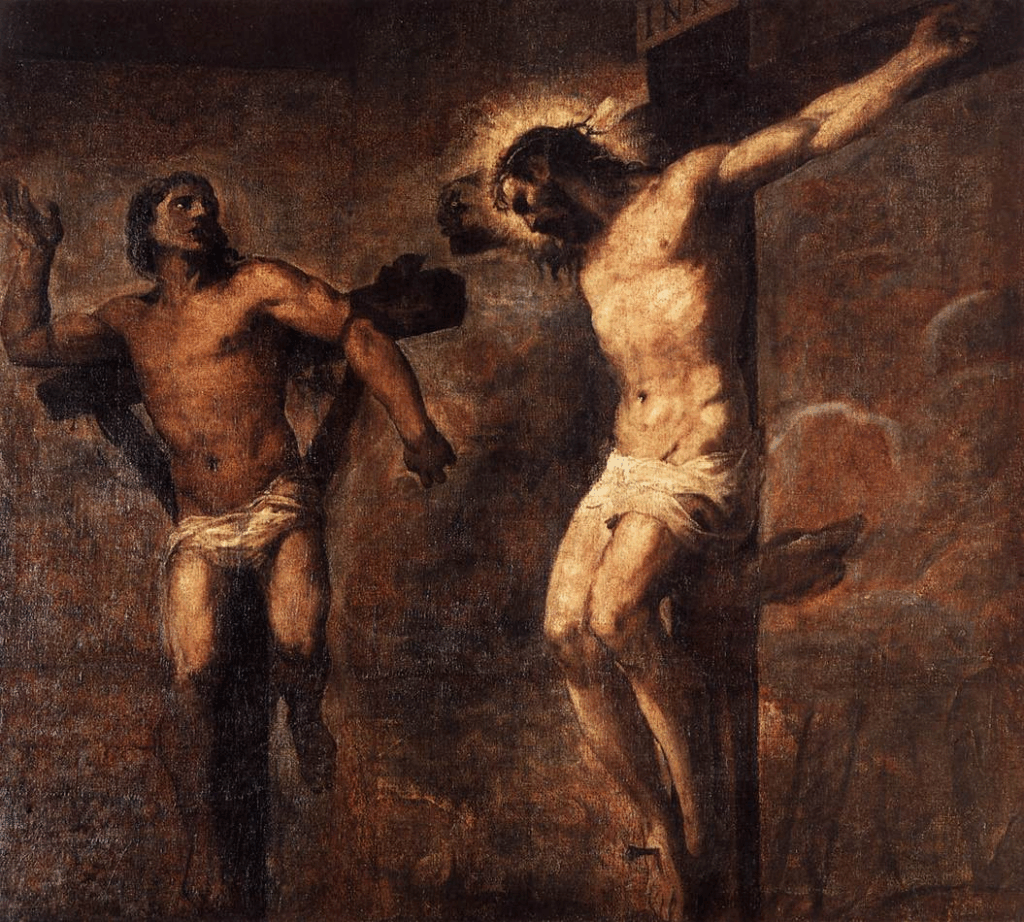Until fairly recently, the notion of monarchy had largely disappeared from our popular attention in many parts of the world, until the coronation of King Charles of the United Kingdom in 2023, and the recent protests against the current President of the United States. Curiously enough, there are 43 active monarchies in the world, though many are limited to figurehead and ceremonial roles.

Christ and the Good Thief, Titian 1566
Just five have absolute power, one of these being Saudi Arabia. And the majority have power that is highly moderated by constitutions and forms of representative government. All this is not to say that our fascination with monarchy has faded, given the international media attention that the coronation of King Charles and Queen Camilla garnered two years ago: approximately 2 billion people across 125 countries.
Personally, for all of my childhood interest in King Arthur and the Knights of the Roundtable, and my love of J.R.R. Tolkien’s Lord of the Rings, I think what most attracted me to this literature was the idea that a benevolent person of good heart and clear intention could use his monarchical power to serve and protect his people, creating conditions for their flourishing. But it is hard to name even a handful of such good and noble kings, who resisted the temptation to abuse that power, and possessed the character or purity heart of Arthur, or Aragorn.
When Lord Acton wrote in 1887 to Bishop Creighton that “power corrupts and absolute power corrupts absolutely,” he conveyed a very pessimistic view of human nature (and yet ironically suggested that for this reason, each person should be given the freedom to govern themselves). But does this corrupting influence by power mean that it should be avoided at all costs?
Certainly, abuses of power touch each of our lives in obvious or subtle ways. Political power that uses polarization to divide and conquer. Economic power that widens the gap between have’s and have nots, and which exploits and extracts valuable resources for a tiny minority of overwhelmingly wealthy people. Social power which concentrates influence with people who may not have any special regard for the common good, but whose celebrity status absorbs tremendous attention and creates inordinate distraction from matters of real importance. Coercive power which uses forceful means to violently oppress, including physical violence against those who are weak or defenseless. And the list goes on. And never exempt from the shadows of human affairs, we have tragically witnessed how these abuses of power happen within the Catholic Church, in the very community that should know better.
Many of us, for these reasons, may resist being given authority, or deny or withhold the power we have at our disposal. We want to avoid doing harm, which is a noble intention. However, from the perspective of discernment, this may be as problematic as the outright abuse of power. Don’t we need people who are conscientiously and ethically mature in their capacity to assess the context, situation, the people, and demands of the moment so that they can discern the appropriate power to exercise at that moment? Don’t we need people who exercise power with intention and skill, informed by love, and who take action with responsibility, accountable for the effects and consequences that follow? Aren’t there conscientious, mature people who are less susceptible to being corrupted by the access to influence?
In the feast we celebrate today, Christ the King, we ponder the way in which he teaches us the true nature of power as given to us by his Father, and the way in which it is to be used. Each of us who is baptized was anointed in that sacrament with the mission to follow his example and to serve as “priest, prophet, and king.” We need people willing to use the power at their disposal in the manner and style of Jesus.
Jesus exercised divine power over demonic forces, restraining and expelling them so that they could not do further harm, liberating those who were possessed. Sometimes, we must use power to protect others. Jesus exercised prophetic power against injustice and on behalf of those who did not have a voice, position, or privilege. Sometimes we must use prophetic and political power to do the same. Jesus exercised social and relational power with people by befriending and walking with them, eating and drinking at their tables and building society with those rejected or discarded by others. Jesus used power to heal, to teach and enlighten, to call people to a deeper and more abundant life. Jesus even used his power to make space for others to discover and exercise their own agency, their own potential… Sometimes, we are called to use our power, agency, knowledge influence, resources, and relationships to do the same good in the world.
In all of this, what distinguishes the ways we see power abused in the world and the way that we witness Jesus exercising power? We know that for Jesus, it always comes back to the question, “how can I be of service?” “How can I make love real?” This, for Jesus, is the fulfillment of the Father’s will, to serve the unfolding of the Kingdom of God and the manifestation of more abundant life.
Another king, Martin Luther King Jr., once said, “Power without love is reckless and abusive, and love without power is sentimental and anemic. Power at its best is love implementing the demands of justice, and justice at its best is power correcting everything that stands against love.”
We may not be kings, but for those of us charged with roles of authority, or who have resources at our disposal, this is the question we want to return to often, in moments of conflict or crisis, moments of opportunity or of uncertainty. How can I be of service? How can I use the resources available to me to make love real in this situation?
As we close the Church year and prepare to enter into the Advent season, perhaps we can make some time to reflect more deeply on the power that God desires to exercise through us on behalf of the Kingdom, on behalf of greater justice, deeper peace, in service of a more abundant life with and for others. The world requires this discerning use of power from us.
With you on the Road,




